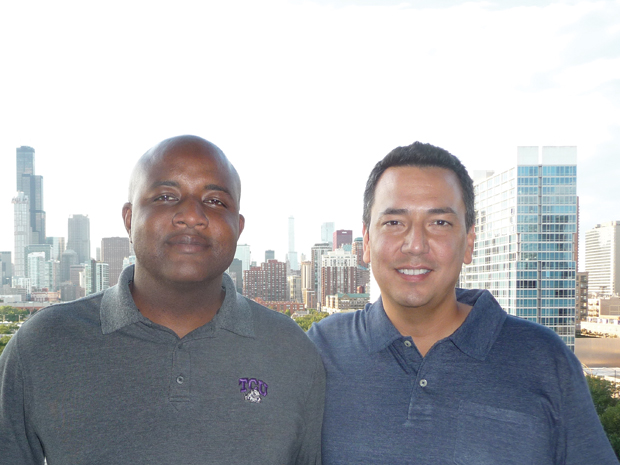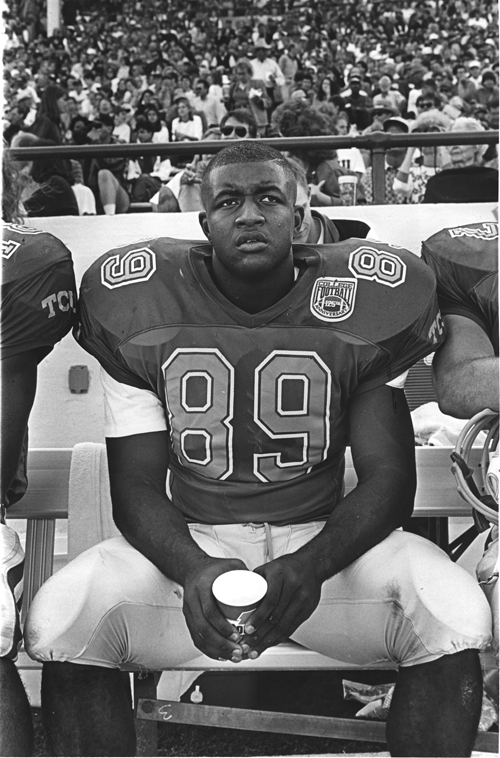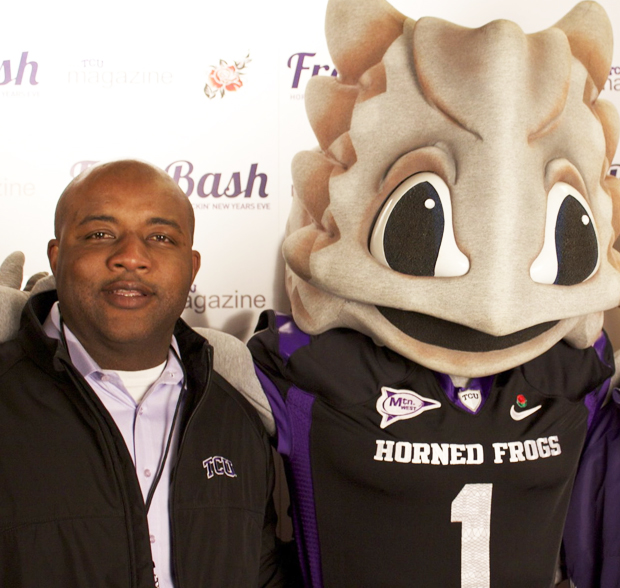Ex-TCU football star Vincent Pryor to accept award for courageously coming out to teammates in 1994

GAME-CHANGER | Former TCU football player Vincent Pryor, left, said he had become suicidal by his junior year until his future partner Alan Detlaff, stood before their social work class one day and announced that he was gay and was beginning a group for LGBT students called TCU Triangle. They would later meet again at JR.’s in Dallas, and have been together ever since.
Vincent Pryor will be in Austin on Wednesday, Feb. 29, to accept the Atticus Circle Award for his courage to come out to his football team his senior year at Texas Christian University in 1994.
Atticus Circle, a group that educates and rallies straight people to advocate for LGBT equality, selected Pryor for the award because “he showed an extraordinary amount of courage to come out as a gay athlete,” Executive Director Ruth Gardner-Loew said.
Pryor said the recognition for inspiring other youth athletes was an honor, but his journey to the confident, gay football player standing before a group of teammates and strangers and owning his sexuality was long and painful.

FINDING HIS GROOVE | Pryor set the school’s single-game sack record against Texas Tech only a few weeks after coming out.
Knowing he was gay since about the third grade, Pryor said growing up Southern Baptist in San Antonio made him begin to constantly worry that school kids would eventually find out and pick on him.
Instead of being the inevitable target, he became the bully, picking on effeminate boys because he was “trying to destroy that thing that was inside of me.” But his façade was shattered one day in seventh grade when one of his victims confronted him in the bathroom about why he tormented people like himself.
“Then he kissed me on the lips,” Pryor recalls about the life-changing day. “And then I knew.”
Although the two of them became friends and Pryor ended his ridiculing days, the fear of people knowing he was gay stayed with him.
Then came days at TCU as a linebacker, where he would go on to set the record of 41⁄2 sacks in a single game against Texas Tech in 1994, only a few weeks after revealing his sexuality. His record still stands today and helped TCU earn a conference title and bowl game invitation at the time.
While the Texas school appealed to him for the access to family back in San Antonio, as well as the family atmosphere of the campus, Pryor worried that his closeted life would be revealed.
“The whole time what I was trying to do was basically hide in plain sight because I always knew
I was gay,” he said. “I just didn’t want anybody to know about it.”
His confidence in his closeted persona was shattered at the start of his sophomore year when a new defensive coach began a meeting by asking if anyone on the team was gay. Pryor said he remembers the coach asking the question repeatedly, and while questions of his sexuality had arisen with little interest in girlfriends, he worried the coach was singling him out.
“Each time that he said it his voice got angrier and his face turned red,” he said. “I was petrified.”
Depression consumed Pryor as the coach’s anger over possible gay players continued to seep into his thoughts throughout the season, leading him to eventually decide that he wouldn’t return to TCU the next year.
“When that coach did that, made that proclamation to the meeting room, it was pretty frustrating and I remember getting really, really depressed,” he said. “I don’t talk too much about it because it was such a dark time, but I actually thought about killing myself.”
Admitting that he actually had a plan to commit suicide by junior year, he said he found courage in the welcoming atmosphere at TCU to

ROSY REUNION | Pryor, shown at the Rose Bowl with Super Frog in 2011, now hopes to tackle the stigma of being gay in sports. ROSY REUNION | Pryor, shown at the Rose Bowl with Super Frog in 2011, now hopes to tackle the stigma of being gay in sports.
push through to the fall of junior year, with the most inspirational event happening shortly after the semester began.
It was Pryor’s current partner Alan Detlaff that stood before their social work class one day and announced that he was gay and was beginning a group for LGBT students called TCU Triangle.
After class, Pryor expressed interest in Detlaff’s group, saying that he supported the LGBT community, and they discussed his sexuality on the phone that night.
Several years after the two graduated, they ran into each other at JR.’s in Dallas and began dating. They live together in Chicago now.
“We saw each other at the bar, and the rest is history,” Pryor said. “We started talking, and here we are 13 years later.”
Pryor’s time in the support group gave him strength, while the rumors of his sexuality started in the locker rooms and hallways, until he eventually agreed to be a speaker at a conference on campus about homosexuality. Many of his teammates were present, but Pryor said his worries about the ridicule he would face afterward never came true.
“I was concerned that I would not be accepted as one of the guys and that people would treat me differently, and none of that happened,” he said.
Even the same coach who once tried to call him out supported him after asking if the declaration was true, and later hugged him on the field after a game and told him he was proud of him, something that will always stay with Pryor.
“That was vindication enough for me, and I really felt like I could be 100 percent. I felt like I could be who I needed to be,” he said. “I’ll never forget that.”
The stigma of being openly gay in sports is false, Pryor said, adding that in his circumstances in 1994 of a gay football player at a Christian university coming out and still being successful on the field is an example that being truthful about sexuality will not hinder someone’s passion or achievements.
“What I can do is live my life out, loud and proud and serve as that beacon and I think the stereotypes will change,” he said.
This article appeared in the Dallas Voice print edition February 24, 2012.

This makes me smile!